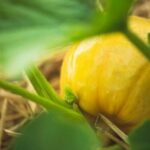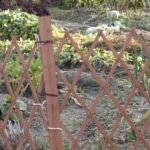Is treated pine bad for vegetable gardens? Treated pine is a common material used in gardening, including for building raised beds, fences, and trellises. It is often chosen for its durability and resistance to decay, making it an attractive option for outdoor use. However, the chemicals used to treat pine can potentially pose risks to the soil and plants in vegetable gardens.
Treated pine is created through a process that involves treating the wood with chemicals such as chromated copper arsenate (CCA), which helps protect it from rot and insects. While this treatment extends the lifespan of the wood, there are concerns about the potential leaching of these chemicals into the surrounding soil. This has raised questions about whether using treated pine in vegetable gardens could harm both soil quality and plant growth.
In this article, we will delve into the process of treating pine, detailing the chemicals involved and their potential impact on vegetable gardens. We will also explore the risks associated with using treated pine in gardening and how it can affect the soil and overall health of plants.
Furthermore, we will provide alternatives to treated pine for those seeking safer options for their vegetable gardens. Let’s take a closer look at whether treated pine is indeed bad for vegetable gardens and what precautions can be taken when using it.
The Process of Treated Pine
Treated pine is a popular choice for construction and gardening due to its durability and resistance to decay. The process of creating treated pine involves the infusion of chemical preservatives into the wood, which helps to protect it from moisture, insects, and fungal decay. This allows the wood to last longer in outdoor environments, making it a desirable option for vegetable garden beds and other outdoor structures.
Pressure Treatment
One common method used to treat pine is pressure treatment. In this process, the pine is placed in a sealed chamber where it’s subjected to high pressure while being infused with preservative chemicals. This helps the chemicals penetrate deep into the wood, providing long-lasting protection against decay and insect damage.
Chemicals Used
The chemicals used in treated pine can vary but often include substances such as copper, chromium, and arsenic. These chemicals are effective at preventing rot and insect infestations, but they can also raise concerns about potential health risks when used in vegetable gardens. It’s important for gardeners to be aware of these chemicals and their potential impact on soil and plant life when considering using treated pine in their gardens.
Environmental Impact
The process of treating pine with these chemicals can also have environmental implications. For example, if not properly disposed of or if the wood is burned, it can release harmful toxins into the air and soil. This raises further concerns about using treated pine in vegetable gardens where food crops are grown. Gardeners must weigh these potential risks when deciding whether or not to use treated pine in their vegetable gardens.
Risks of Treated Pine
Treated pine is a popular material used in gardening due to its durability and resistance to decay, making it an attractive choice for constructing raised beds, fences, and other outdoor structures. However, the process of treating pine involves the use of chemicals that can pose potential risks when used in vegetable gardens.
The treatment process typically involves impregnating the wood with various chemicals such as chromated copper arsenate (CCA) or alkaline copper quaternary (ACQ) to protect it from rot and insect damage. These chemicals are effective at preserving the wood, but they can also leach into the surrounding soil over time, potentially causing harm to plants and even posing health risks to humans if consumed through contaminated vegetables.
When treated pine is used in vegetable gardens, there is a risk of these chemicals leaching into the soil and being absorbed by the plants. This can impact the quality and safety of the produce grown in the garden. Additionally, certain chemicals used in treated pine products have been linked to adverse effects on human health, so it’s important to consider these potential dangers when deciding whether to use treated pine in a vegetable garden.
To minimize the potential dangers of using treated pine in vegetable gardens, there are several precautions that gardeners can take. One option is to line the interior of raised beds with a barrier such as heavy-duty plastic sheeting to prevent direct contact between the treated wood and the soil. Additionally, choosing alternative materials such as cedar or naturally rot-resistant woods can help mitigate potential risks while still providing durable options for garden construction.
By considering these potential dangers and taking appropriate precautions, gardeners can make informed decisions about whether or not to use treated pine in their vegetable gardens. Being aware of the risks associated with treated pine allows for safe and responsible gardening practices while still enjoying its benefits.
Impact on Soil
Treated pine, which contains chemicals that can be harmful to the environment and human health, is often used for outdoor projects such as building raised beds in vegetable gardens. However, the use of treated pine in vegetable gardens can have a negative impact on the soil.
Leaching of Chemicals
One of the main concerns with using treated pine in vegetable gardens is the leaching of chemicals into the soil. The preservatives used in treated pine, such as copper, chromium, and arsenic, can seep into the surrounding soil over time. This leaching process can contaminate the soil with these toxic chemicals and potentially harm both plants and beneficial organisms in the garden.
Soil pH and Nutrient Imbalance
Another way that treated pine can affect the soil in vegetable gardens is by altering its pH and nutrient balance. The presence of chemicals from treated pine can disrupt the natural pH levels of the soil, making it too acidic for some plants to thrive. Additionally, these chemicals can interfere with nutrient uptake by plants, leading to imbalances that may hinder their growth and overall health.
Long-Term Effects
Even if immediate signs of damage are not evident, the long-term effects of using treated pine in vegetable gardens can be detrimental. Gradual accumulation of toxins in the soil can persist over time and pose a continuous risk to plant growth. Furthermore, as these chemicals are not biodegradable, they can linger in the environment even after the treated pine has degraded.
Potential Harm to Plants
Treated pine is a commonly used material in gardening, including vegetable gardens, due to its affordability and durability. However, many gardeners are concerned about the potential harm that treated pine may cause to their plants. It is important to understand how treated pine can negatively impact the growth of vegetables in order to make informed decisions about using this material in your garden.
One of the main concerns with using treated pine in vegetable gardens is the chemicals involved in the treating process. The most commonly used chemical for treating pine is chromated copper arsenate (CCA), which contains arsenic, chromium, and copper. These chemicals can leach into the soil over time and be absorbed by the vegetables, posing a risk to human health when consumed.
Furthermore, treated pine can also have a direct impact on plant growth. The chemicals in treated pine can alter the pH levels of the soil, making it less hospitable for certain plants. In addition, excess copper from treated pine can inhibit root development and nutrient uptake in vegetables. This can lead to stunted growth, reduced yields, and even plant death.
To avoid these potential harms to plants in your vegetable garden, consider alternative materials such as cedar or redwood for raised beds or landscaping timbers. These materials are naturally resistant to decay and do not require chemical treatments. Additionally, using untreated lumber or composite materials like recycled plastic lumber are safe alternatives that will not pose risks to your plants or your health.
Alternatives to Treated Pine
Treated pine is often used in gardening because of its durability and resistance to decay, but there is an ongoing debate over whether it is safe for use in vegetable gardens. For those who are concerned about the potential risks associated with treated pine, there are several alternative materials that can be used instead. These alternatives offer a safer and more natural option for those looking to create a healthy and sustainable environment for their vegetable garden.
One popular alternative to treated pine is cedar wood, which naturally repels insects and resists rotting without the need for chemical treatment. Cedar is also known for its beautiful appearance, making it an attractive choice for garden beds. Another option is redwood, which is naturally resistant to decay and often used in outdoor construction. Like cedar, redwood does not require chemical treatment to maintain its durability, making it a safer choice for vegetable gardens.
In addition to natural wood options, recycled plastic lumber or composite materials are becoming increasingly popular choices for vegetable garden beds. These materials are made from recycled plastics and wood fibers, offering the durability of traditional wood without the risk of leaching harmful chemicals into the soil. They are also low-maintenance and long-lasting, making them a sustainable choice for environmentally conscious gardeners.
The key factor to consider when choosing an alternative to treated pine is ensuring that the material is safe for use in contact with soil and plants, especially in a vegetable garden where edibles will be grown. By opting for one of these alternatives, gardeners can avoid potential risks associated with treated pine while still enjoying the benefits of a durable and long-lasting material.
| Alternative Material | Benefits |
|---|---|
| Cedar Wood | Naturally resistant to decay; repels insects; attractive appearance |
| Redwood | Naturally resistant to decay; durable; does not require chemical treatment |
| Recycled Plastic Lumber/Composite Materials | Made from recycled materials; low-maintenance; long-lasting |
Safety Precautions
Treated pine is a commonly used material in gardening, especially for creating raised beds and borders in vegetable gardens. This is due to its affordability, durability, and resistance to rot and decay.
Treated pine is created by infusing the wood with chemicals such as alkaline copper quaternary (ACQ) or copper azole, which help protect it from insects and fungal decay. However, many gardeners have concerns about whether treated pine is safe to use in vegetable gardens due to the chemicals involved in its treatment.
When using treated pine in vegetable gardens, there are several safety precautions that can be taken to minimize potential risks. Firstly, it is important to handle treated pine with gloves and a mask to avoid direct contact with the chemicals present in the wood.
Additionally, it is recommended to avoid using treated pine for any structures that will come into direct contact with the soil where vegetables are grown. Instead, consider lining the inside of raised beds with a barrier such as heavy-duty plastic to prevent leaching of chemicals into the soil.
Furthermore, when using treated pine for vegetable garden structures, it is essential to allow the wood to weather for at least several months before planting any vegetables. This will help reduce the risk of chemical leaching into the soil and impacting plant growth. Additionally, regularly testing the pH levels of the soil can help monitor any potential changes caused by using treated pine in the garden.
Finally, if there are still concerns about using treated pine in vegetable gardens, there are alternative materials that can be used as a safer option. For example, untreated cedar or redwood are naturally resistant to decay and insects without requiring chemical treatment.
| Safety Precautions | Recommendations |
|---|---|
| Handle Treated Pine | Use gloves and a mask when handling treated pine |
| Avoid Direct Contact | Avoid using treated pine for structures that come into direct contact with vegetable garden soil |
| Weakening Chemicals | Allowing treated pine to weather for several months before planting vegetables reduces risk of leaching into soil |
Conclusion
In conclusion, while treated pine is a commonly used material in gardening due to its durability and resistance to decay, it is important for gardeners to carefully consider the potential risks involved in using this type of wood in vegetable gardens. The process of creating treated pine involves the use of chemicals that can pose hazards to both the soil and the plants. These chemicals can leach into the soil, impacting its fertility and potentially harming the growth of vegetables.
The impact of treated pine on soil and plant health is a significant concern for gardeners who prioritize organic and sustainable practices. The potential harm to plants grown in soil treated with pine chemicals is also a cause for caution. Gardeners should be aware of these risks and take appropriate safety precautions if they choose to use treated pine in their vegetable gardens.
In light of these potential risks, it may be advisable for gardeners to explore alternative materials that can be used in vegetable gardens, such as cedar or redwood, which are naturally resistant to decay without the need for chemical treatment. Ultimately, while aesthetically pleasing and long-lasting, the question remains: Is treated pine bad for vegetable gardens?
Based on the evidence discussed, careful consideration should be given before using treated pine in vegetable gardens, with an emphasis on weighing the potential risks against any perceived benefits.

If you’re looking to get into vegetable gardening, or are just looking for some tips on how to make your current garden better, then you’ve come to the right place! My name is Ethel and I have been gardening for years. In this blog, I’m going to share with you some of my best tips on how to create a successful vegetable garden.





